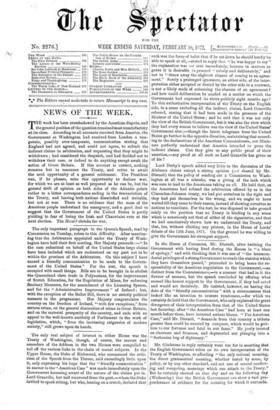The only real subject of interest in either House was
the Treaty of Washington, though, of course, the movers and seconders of the Address in the two Houses were compelled to tell off the various links in the chain of unreal subjects. In the Upper House, the Duke of Richmond, who commenced the criti- cism of the Speech from the Throne, said exceedingly little upon it, only expressing his hope that the " friendly communication " in answer to the "American Case " was made immediately upon the Government becoming aware of the nature of the claims put in. Lord Granville, but half recovered from the gout,—whom the Duke invited to speak sitting, but who, leaning on a crutch, declared that
such was the force of habit that if he sat down he should hardly be able to speak at all, —stated in reply that " he was happy to say" the explanation was not sent immediately, because in matters so grave it is desirable to proceed " calmly and deliberately," and not to " throw away the slightest chance of coming to an agree- ment." Surely a prolonged ignorance, on either side, of the inter- pretation either accepted or denied by the other side to a contract, is not a likely mode of enhancing the chances of an agreement ? and how could deliberation be needed on a matter on which the Government had expressed its views publicly eight months ago ? To this authoritative interpretation of the Treaty on the English side, in a sense excluding all the indirect claims, Lord Granville referred, stating that it had been made in the presence of the Minister of the United States ; and he said that it was not only the view of the British Government, but Ulna also the view which they had every reason to believe was the view of the United States' Government also ;—though the latest telegrams from the United States go further in the opposite direction, maintaining that accord- ing to the declarations of the American Commissioners, our Minis- ters perfectly understood that America intended to press the indirect claims. Can they give us any public proof of their assertion,—any proof at all such as Lord Granville has given us of his ?


































